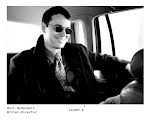? ?!
Those of you who know Carmina Burana know there is
a Black Swan in it, actually a white swan roasted black:
The Roasted Swan
Neither the surprised bird nor Carmina Burana shows
up in Nassim Nicholas Taleb's The Black Swan, but
this doesn't stop the book from being the perfect gift for
the young filmmaker or novelist starting out into a career
in which randomness (or luck, if you prefer) plays a large
role. Taleb has caught the artist's predicament very well,
covering everything from how rewards are doled out to
artists in a less satisfying manner than to accountants
to the real toll the success of lesser artists exacts from the artist
struggling with lack of recognition and the knowledge that
there is a very real chance - a strong probability if one is
honest with oneself - that not only will he or she neither get
the money nor attract the many attractive people attracted to
success, but that the work itself, that for which all else has been
sacrificed, might well vanish into a void too.
By Black Swan he means a highly improbable event,
say 9-11 or a stock market crash. People in power and
insurance executives fear Black Swans, but obscure artists
chase after them. For filmmakers, even getting into a film
festival is a highly improbable event if they have no
actors the public has heard of. The one Black Swan I have
managed to catch is winning the Jury Prize for Screenwriting
at Slamdance in 2004 for NIGHTINGALE IN MUSIC
BOX, which I also directed.
This was the only one of my four features to make any
splash on the festival scene, eventually winning several
more prizes and playing European festivals as well.
Slamdance receives over 5,000 submissions per year with
about 3,0000 of of them being features. They show under
30 features, meaning getting shown there at all is by
objective measure a highly improbable event.
It leads to Park City, but it did not lead to fame and fortune,
and my next film BLACK MAIL has had the same difficulty
all my films previous to NIGHTINGALE had even getting into
a festival. What's the difference between NIGHTINGALE'S relative
success - you can buy it on Amazon after all! - and the
obscurity of my other films? Taleb would argue that it's as
likely to be a question of luck as of the quality of the movies
themselves. To say I was lucky with NIGHTINGALE is not
to deny its quality, but just to say the first reviewer had to
like science fiction, or be in a good mood that day to even
give the film a chance.
Taleb's concern with randomness and luck reminds me
of Boethius and his Consolation of Philosophy, a wonderful
book whose Wheel of Fortune shows up in 24 Hour Party
People. Taleb also finds some consolation in randomness,
especially since the internet now gives the obscure thinker
or artist a place to wait in the antechamber of success for
the work to be discovered.* This is because work can
survive basically forever in digital form on the net. He
uses the term long tail to refer to this relative permanency
of any work now, no matter how obscure, and says of the
long tail: "the world is made no less unfair for the little
guy, but it now becomes extremely unfair for the big man.
Nobody is truly established."
In other words, those at the top of the wheel will come
down when it turns again - thereby creating room at the
top - and so those of us who feel we have not yet
received the attention our work deserves can pray,
Oh, Fortune, turn your wheel one more time!
--- ---- -----
*Of course it could turn out to be the antechamber
of further obscurity too. There is no way to tell is
one of his points. The insecurity is not only
frustrating but over the course of a lifetime injurious
to the health of the artist, Taleb argues.
I want to stress that I can not comment on his
economic advice, which is what he is best known
for. I just do not know enough about it.
Subscribe to:
Post Comments (Atom)

No comments:
Post a Comment